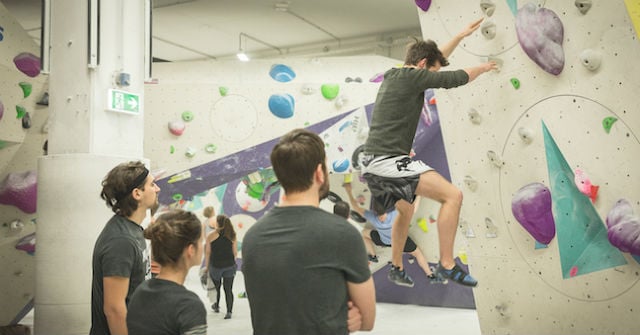Moving from London to Berlin wasn’t a difficult decision. It was easy to say goodbye to the twice-daily rush hour commute, the culture of never taking a lunch break and always staying late in the office. Berlin has a low cost of living, world-class night life and it’s socially acceptable to eat kebabs during the day time. It sounded ideal.
But moving to Germany isn’t as easy as it sounds. On my first day in Berlin I walked into my local Sparkasse with a huge grin on my face and said, “Hello there! I’d like to open a bank account, bitte!” The woman behind the desk gave me a withering look and said “Where is your Anmeldung?”
Sign up to Urban Sports Club today – get fit, discover new hobbies and make new friends.
I quickly discovered other cultural differences, including that it’s not common to go for drinks after work on a Friday. This Friday routine, ingrained in me since my first job in London in 2012, was the only way I knew how to make friends. I spent my first few Friday nights in Germany training at my local gym and cooking elaborate meals. I soon realised I needed to find a way to make friends that fit with the culture here. Then I met a woman at a storytelling night at an English bookshop in Kreuzberg who suggested I go bouldering with her.
“Have you heard of Urban Sports Club?” she asked.
 Photo: Urban Sports Club
Photo: Urban Sports Club
I looked into it and found that in one membership I’d have access to tons of bouldering halls in Berlin and could go to loads of other fitness venues across the city, including the gym I was already a member of. It felt like a no-brainer. I hoped I could get fit and find a social life at the same time.
Sign up to Urban Sports Club today – get fit, discover new hobbies and make new friends.
The following week I went bouldering with my new pal from the bookshop. Here’s what I learnt:
1. There’s a strong bouldering community and they’re very welcoming
I didn’t know what bouldering was until I tried it. If you don’t either, it’s basically a climbing wall without the ropes. On my first day bouldering I met about six new people, all from different parts of the world. They’re part of a big group that go bouldering together three times a week, and they added me to their WhatsApp group immediately so I could go bouldering with them whenever I felt like it.
2. Boulderers go on trips at the weekend!
This is ideal. Moving country alone means it can be hard to fill up your weekends. Indoor Bouldering was invented as a way to train during winter – the sport was originally meant to be outside in the fresh air. After my first climbing experience I was super excited to improve so I could join one of the group trips to some outdoor climbing spots in Germany. It’s a great way to discover places I otherwise probably wouldn’t have known about.
3. It’s a great way to get to know your new friends
Bouldering is like a puzzle. You start with easy routes, but as you get better the routes become more difficult and you have to move tactically to get to the next hold. As a result, the people you boulder with help you to navigate the route. It’s almost like a team sport and creates a bond with whoever you go bouldering with. And then, when you’ve finished your route, you sit on the mats, chat and watch other climbers solve the puzzle.
 Photo: Urban Sports Club
Photo: Urban Sports Club
4. Every bouldering gym has events and meetups
This means that if you feel at a loss one evening, there will almost definitely be a meetup in a bouldering spot in your city where you can get some great exercise and meet like-minded people.
5. It’s really good for you!
Bouldering is a full-body workout. You work everything from the tips of your fingers to the tips of your toes, your core, legs, arms – everything! So after a few months bouldering, not only will you have a great social life but you’ll be more toned with supernatural gripping abilities.
Conclusion: I couldn’t have chosen a better activity to start my mission of settling into Germany and making new friends. Bouldering halls host so many activities and events, I could fill up every night of the week. But I can’t stop here – next week find out what I learnt when I tried out Zouk.
If you’re interested in getting fit, finding new hobbies and meeting new people, check out Urban Sports Club’s bouldering partners across Germany.
Urban Sports Club is the largest, most flexible and diverse sports offer in your city with over 50 types of sports and over 2000 partner venues in 20+ cities across Germany.
Visit your local yoga studio, go swimming, bouldering, have a gym session, take a dance class or make new friends in Urban Sports Club's team sport communities. All of this in one membership at a fixed cost that you can cancel at just one month's notice.
In the Urban Sport of the Week series, a member of the USC team tries a different sport to encourage members to do the same – because new sports lead to new hobbies and new friends.



 Please whitelist us to continue reading.
Please whitelist us to continue reading.